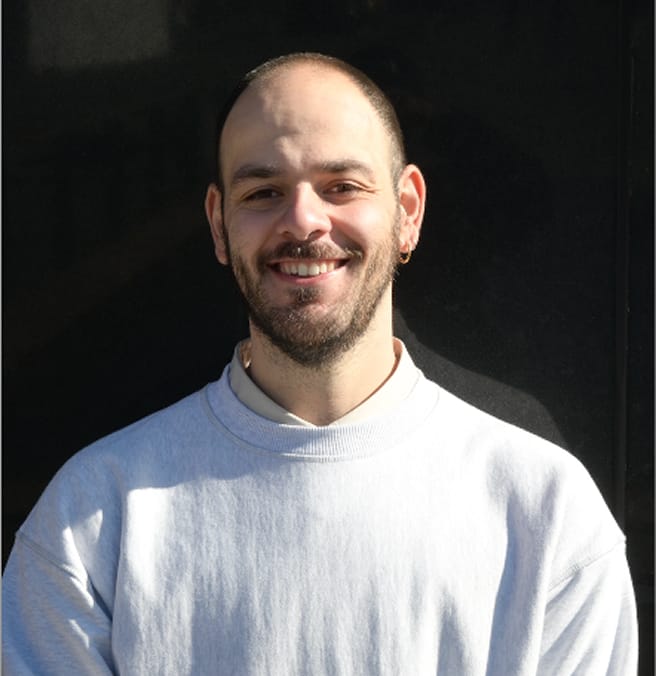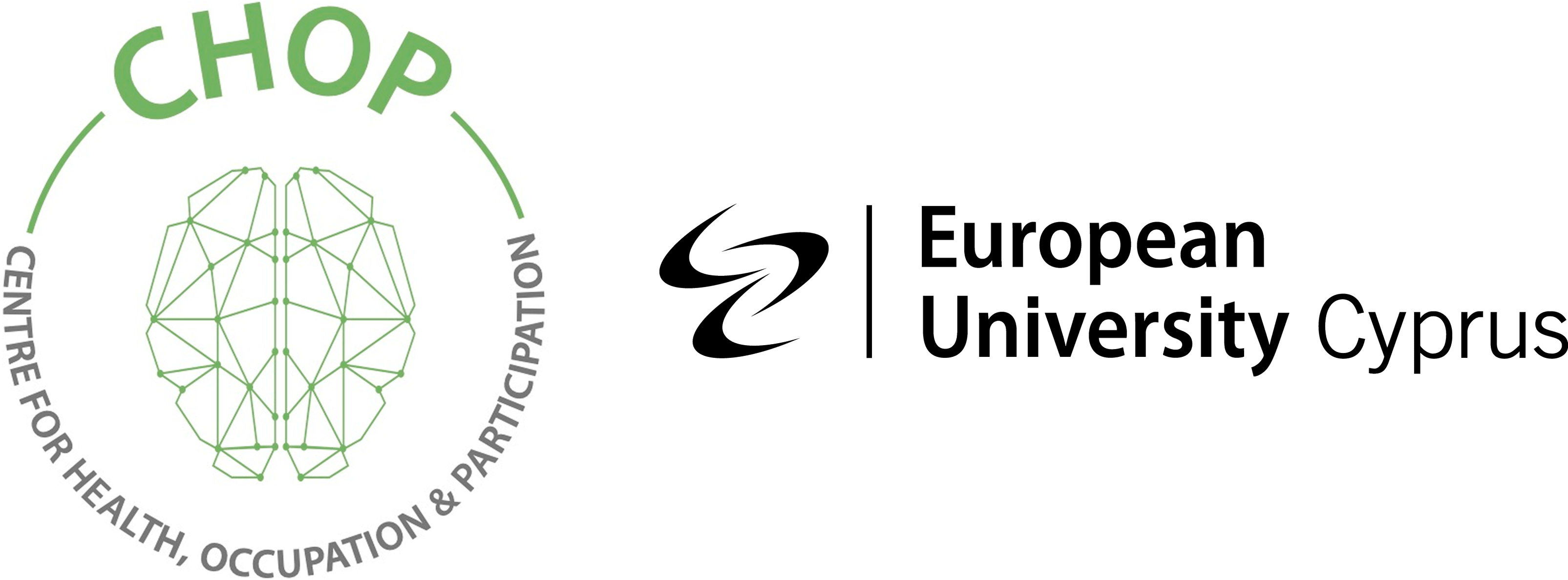Lifestyle Shaping for Health and Well-being
Led by: Stavros Orologas
+357 22559486
lifestyle.lab@euc.ac.cy
What is the Role of Occupational Therapy in Lifestyle Redesign
Lifestyle redesign is a person-centered, empowering approach that supports individuals in making sustainable and health-enhancing changes to their daily lives. It focuses on everyday habits, routines, and roles—key elements that can significantly influence a person’s physical, mental, and social well-being.
In occupational therapy, we explore how a person lives their daily life: what they do, where, how, and with whom. Together, we co-design a new, more balanced and healthier lifestyle that promotes overall health and quality of life.
Through collaboration with an occupational therapist, you can identify aspects of your lifestyle that support or hinder your well-being and begin to build a new daily routine. This may include introducing healthy habits, reducing risk factors such as sedentary behavior or occupational imbalance, strengthening self-management skills, and reconnecting with meaningful activities.
Occupational therapy is closely linked to health promotion and disease prevention. Engaging in meaningful activities can serve as a protective factor against chronic conditions such as diabetes, heart disease, and mental health disorders. On the other hand, a lack of meaning in everyday life and participation in harmful routines can increase the risk for lifestyle-related illnesses.

Free Service

Group or Individual sessions

Online or In Person

Educating EUC Students
Key Features of the “Pathway to Wellness” Program for healthy weight
Pathway to Wellness is the Cypriot adaptation of the DO:IT (Danish Obesity Intervention Trial) program, developed in close collaboration with the research team at the Research Unit of General Practice, Aarhus University in Denmark. Its aim is to support adults with increased body weight (BMI 25–35) in making sustainable lifestyle changes that improve their quality of life and satisfaction in everyday living.
Increased body weight, beyond being a risk factor for certain health conditions, can also negatively affect a person’s ability to participate in meaningful activities or act as a barrier to enjoying daily life.
The main features of the program include:
Establishing New Habits
The program encourages individuals to re-evaluate their daily routines and cultivate new, personalized, and supportive habits—such as reducing sedentary behavior and adapting activities to increase the frequency and intensity of physical movement.
Balanced Daily Life (Occupational Balance)
Occupational therapy techniques are used to help structure a varied and balanced daily routine tailored to each participant’s needs, interests, and goals.
Skill-Building and Knowledge Development
The intervention focuses on empowering participants through education, helping them gain practical knowledge and skills mainly through cognitive behavioral approaches that support the integration of new habits in a realistic and achievable way.
Eating Behavior and Wellness
As occupational therapists, we don’t prescribe diets — instead, we explore eating habits as part of daily life. Together with each person, we work on building awareness around food-related routines, time management, meal planning, and choices that support a balanced diet.
Social Support and Empowerment
The program fosters the creation of a positive social network through group sessions and/or by enhancing social skills and encouraging re-engagement with roles or activities that may have been abandoned.
Ongoing Guidance and Reflection
The program runs for five months and includes weekly sessions (group or individual, in-person or online). Each session involves reflection, progress tracking, and reinforcement of personal responsibility and active participation.
The Lifestyle Shaping Team

Stavros Orologas
Special Teaching Personnel in Occupational Therapy | Coordinator & Clinical Educator, Lifestyle Shaping for Health and Well-being Clinic | Department of Health Sciences
Stavros Orologas is an occupational therapist with a BSc from the Technological and Educational Institute of Athens and an MSc in Occupational Therapy from Jönköping University in Sweden. He has a strong background in family, child, and adolescent health, with extensive experience delivering client-centred care in outpatient settings. He holds several certifications in client-centred and cognitive-behavioral approaches and has been trained in community engagement methods that foster innovation through collaboration with citizens, stakeholders, and service providers.
Stavros currently serves as Special Teaching Personnel and Clinical Educator at European University Cyprus. He is certified in “New in Teaching” by Advance HE (Higher Education) and teaches courses such as Introduction to Occupational Therapy, Interprofessional Education, and Client-Centred Practice. He has developed a role-emerging placement focused on healthy weight and lifestyle modification, aiming to enhance quality of life and prevent chronic diseases, while also providing clinical education and supervision to undergraduate students.
His research interests include health-supportive patterns of occupational performance, social , occupational therapy education, and co-production in health and social care.
Supportive Material
European Observatory on Health Systems and Policies. (2023). Cyprus: Country Health Profile 2023. State of Health in the EU. OECD Publishing.
This report highlights key trends in health and healthcare in Cyprus, with a particular focus on lifestyle-related health factors. While Cyprus enjoys a high life expectancy, the report raises concerns about unhealthy lifestyle habits contributing to rising chronic disease rates. Notably, childhood obesity is among the highest in the EU, reflecting poor dietary habits and insufficient physical activity from an early age. Adult obesity is also increasing, further stressing the healthcare system.
World Health Organization. (2020). WHO guidelines on physical activity and sedentary behaviour. World Health Organization.
These global guidelines provide physical activity evidence-based recommendations for all age groups—children, adolescents, adults, older adults, and special populations (e.g., pregnant women, people with chronic conditions or disabilities).
AJOT Authors & Issues Episode 21: OTs role in Obesity Prevention
This episode of AJOT Authors & Issues features Dr. Beth Fields, Chloe Muntefering, and Dr. Jeanette Christensen discussing their research on occupational therapy’s role in obesity prevention. They explore the distinction between reactive and proactive approaches to managing obesity, the importance of interprofessional collaboration, and the need for occupational therapy to take a larger role in primary prevention efforts. The conversation highlights practical examples of how OTs can contribute to healthier lifestyles and the challenges faced in promoting obesity prevention within the current healthcare system.
Frequently Asked Questions
What does an occupational therapist do in a lifestyle redesign program for weight management?
Occupational therapists help individuals explore and adjust their daily routines, habits, and roles to support healthier living. We don’t focus on weight alone, but on creating a meaningful, balanced life that supports physical, mental, and social well-being.
Do occupational therapists provide diet plans or nutritional advice?
No. Occupational therapists do not prescribe diets or act as nutritionists. We help people build healthier eating habits and routines, focusing on awareness, time use, and function — always within their everyday life.
Who is this program for?
The program is designed for adults with a BMI between 25–35 who wish to make realistic and lasting lifestyle changes to support their well-being and participation in meaningful daily life.
How is this different from a typical weight-loss or fitness program?
Occupational therapy focuses on the whole person — not just weight or fitness. We explore daily life patterns, roles, environments, and habits to support long-term change through meaningful engagement and personal empowerment.
What can I expect during the sessions?
Sessions are held weekly (in-person or online) and may be individual or group-based. They include guided reflection, habit-building, progress monitoring, and tools to support self-management in daily life.
Join the Lifestyle Shaping for Health and Well-being Lab
Through collaboration with an occupational therapist, you can identify aspects of your lifestyle that support or hinder your well-being and begin to build a new daily routine. Become a part of our lab today!
